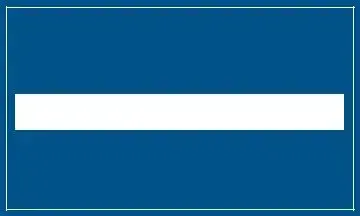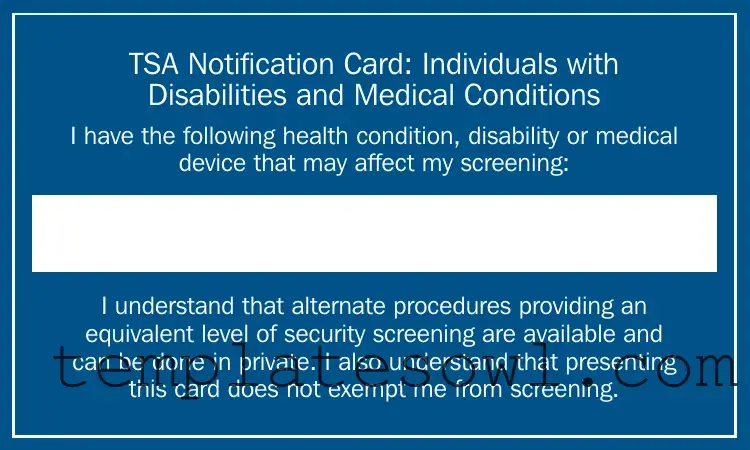Fill Out Your Tsa Notification Card Form
The TSA Notification Card is an essential tool for travelers with disabilities or medical conditions that may influence their airport screening experience. This card allows individuals to communicate their specific health needs without fear of stigma or misunderstanding. While it does not exempt travelers from screening, it facilitates the process by indicating the presence of particular health conditions, disabilities, or medical devices that may need attention. Alternate screening procedures ensuring the same level of security are available and can be conducted in a private setting, promoting a respectful experience. Moreover, the TSA provides resources for assistance requests, compliments, and complaints through their dedicated line, TSA Cares. Travelers are encouraged to reach out at 1-855-787-2227 for support, which is available on weekdays from 8 a.m. to 11 p.m. ET, and weekends or holidays from 9 a.m. to 8 p.m. ET. For non-English speakers, automated information is provided in twelve languages, emphasizing the TSA's commitment to accessibility. Notably, it's advisable to contact the TSA at least 72 hours before travel if special assistance from a Passenger Support Specialist is required at the checkpoint. In the event that a Passenger Support Specialist is unavailable, travelers can request a Supervisory TSA Officer for additional support during the screening process.
Tsa Notification Card Example

TSA Notification Card: Individuals with Disabilities and Medical Conditions
I have the following health condition, disability or medical
device that may affect my screening:
I understand that alternate procedures providing an equivalent level of security screening are available and can be done in private. I also understand that presenting this card does not exempt me from screening.

Information • Assistance Requests • Compliments • Complaints
TSA Cares
Weekdays: 8 a.m. to 11 p.m. ET
Weekends/Holidays: 9 a.m. to 8 p.m. ET
Hablamos Español
Automated information offered in 12 languages
Call 72 hours prior to traveling to request the assistance of a
Passenger Support Specialist (PSS) at the checkpoint. If a PSS is not available, you may ask for a Supervisory TSA Officer at the checkpoint.
Form Characteristics
| Fact Name | Detail |
|---|---|
| Purpose | The TSA Notification Card is designed to help travelers with disabilities and medical conditions during security screening. |
| Screening Impact | Carrying this card does not exempt individuals from standard screening procedures. |
| Alternate Procedures | Those using the card can request alternate screening procedures, which provide the same level of security but can be done privately. |
| Emergency Assistance | Travelers can call TSA Cares at 1-855-787-2227 for assistance, compliments, or complaints. |
| Availability | TSA Cares is available weekdays from 8 a.m. to 11 p.m. ET and weekends/holidays from 9 a.m. to 8 p.m. ET. |
| Language Support | Automated information is available in 12 languages to assist diverse travelers. |
| Advance Request | Travelers should call 72 hours prior to their flight to request a Passenger Support Specialist at security checkpoints. |
| Supervisory Assistance | If a Passenger Support Specialist is unavailable, travelers can ask for a Supervisory TSA Officer at the checkpoint. |
| Contact Options | For assistance, travelers can also reach out via email at TSA-ContactCenter@tsa.dhs.gov. |
| Inclusivity | The card promotes inclusivity for individuals with various health conditions, ensuring they receive necessary support. |
Guidelines on Utilizing Tsa Notification Card
The TSA Notification Card serves an important purpose for individuals with disabilities or medical conditions. It helps facilitate appropriate accommodations during the airport screening process. Below are clear instructions to assist you in filling out this essential form.
- Begin by clearly stating your full name at the top of the card.
- In the next section, identify your specific health condition, disability, or the medical device that may affect your screening process. Be concise but thorough in your description.
- Find the checkbox confirming your understanding that alternate procedures are available for screening. Mark this box to indicate your acknowledgment.
- Next, acknowledge that presenting the card does not exempt you from screening by checking the corresponding box.
- Provide any additional details relevant to your situation in the designated area. This can include specific needs or requests for assistance.
- Once you have filled in all required information, review the card for accuracy to ensure all details are correct.
- Finally, sign and date the card at the bottom to validate your submission.
After completing the form, it may be beneficial to keep it handy for your travel plans. If you have any questions or need assistance, do not hesitate to reach out to TSA Cares or the designated contact information provided.
What You Should Know About This Form
What is the TSA Notification Card?
The TSA Notification Card is a helpful tool for individuals with disabilities and medical conditions. It informs TSA agents about a passenger's specific health condition, disability, or medical device that may require special screening accommodations at airport checkpoints.
How does the TSA Notification Card work?
When you present the TSA Notification Card, it alerts security personnel to your unique needs during the screening process. The card does not exempt passengers from screening, but it does ensure that alternative procedures, providing an equivalent level of security, can be performed in private.
Who should use the TSA Notification Card?
This card is designed for individuals who have a health condition, a disability, or a medical device that may affect security screening. If you feel that you need to communicate your needs discreetly during the screening process, this card can be very beneficial.
Will using the TSA Notification Card guarantee I will not go through screening?
No, presenting the TSA Notification Card does not exempt you from the security screening process. Instead, it helps to facilitate accommodations that can make the experience more comfortable and appropriate for your unique situation.
How can I request assistance when traveling with a disability or medical condition?
You can call TSA Cares at 1-855-787-2227 at least 72 hours before flying. This service can arrange for a Passenger Support Specialist to assist you at the checkpoint. If a PSS is not available, you have the option to ask for a Supervisory TSA Officer upon arrival at the checkpoint.
What kind of inquiries can I make regarding TSA services?
Passengers can reach out with various inquiries, such as assistance requests, compliments, or complaints regarding TSA services. The TSA contact center is available via phone and email to address these matters effectively.
Are there any language services available through TSA?
Yes, the TSA contact center provides automated information in 12 languages. This service ensures that individuals who speak different languages can access essential information about the screening process.
When are the TSA Cares services available?
TSA Cares services are available weekdays from 8 a.m. to 11 p.m. ET and weekends or holidays from 9 a.m. to 8 p.m. ET. This schedule allows travelers ample opportunities to seek assistance before their flights.
How do I contact TSA for further information?
You can reach the TSA contact center by calling 1-855-787-2227 or via email at TSA-ContactCenter@tsa.dhs.gov. Both options offer a way to gather information regarding the TSA Notification Card and other services related to traveling with disabilities and medical conditions.
Common mistakes
Filling out the TSA Notification Card form can be a straightforward process, but many people make mistakes that can complicate their travel experience. Awareness of these common errors can help ensure smooth screening. One mistake is not listing all relevant health conditions. It's important to disclose any disabilities or medical devices that might affect screening procedures. Leaving out critical information could lead to delays or misunderstandings during the screening process.
Another common issue is failing to understand the card's purpose. Some believe that having the card means they will skip security screening altogether. However, it's crucial to remember that this card does not exempt travelers from screening. Individuals must still go through security, but alternative procedures can be requested.
Many individuals also overlook the importance of contacting TSA Cares in advance. It’s advisable to call 72 hours before traveling. This call enables you to request the assistance of a Passenger Support Specialist, ensuring that any necessary accommodations can be arranged in advance, making your travel experience easier and less stressful.
Additionally, incorrectly completing personal information is another frequent mistake. Check that all your details, such as name and contact information, are accurate. Any inaccuracies may hinder TSA’s ability to reach you if needed.
Another area of concern is ignoring the availability of resources. The TSA provides automated information in various languages. If you or someone traveling with you speaks another language, using these resources can make communication smoother during travel.
A further mistake to consider is not asking for help when needed. If you find there are no Passenger Support Specialists available at the checkpoint, you should not hesitate to ask for a Supervisory TSA Officer. They are trained to assist with reasonable accommodations.
Finally, failing to keep a copy of the completed card can be problematic. Having a copy allows individuals to refer back to the information provided if questions arise or if there is a need to verify the details during the screening process. Such a proactive measure helps avoid confusion and promotes a smoother traveling experience.
Documents used along the form
The TSA Notification Card is an important document for individuals with disabilities and medical conditions, ensuring that their specific needs during security screening are met. However, several other forms and documents are often used alongside the TSA Notification Card to facilitate a smoother travel experience. Here’s a list of some common documents that may be needed:
- Disability Certification Letter: This letter, often issued by a healthcare provider, confirms an individual's disability and may help in obtaining needed accommodations during travel.
- Travel Assistance Request Form: This form allows travelers to request specific assistance services from the airline or airport prior to their journey.
- Medical Device Documentation: Proper documentation of any medical devices helps inform TSA officers about equipment that may need special handling during screening.
- Aisle Chair Request Form: This form can be filled out to ensure an aisle chair is available for individuals who have difficulty walking through the airport.
- Service Animal Documentation: Forms or letters indicating the type and function of a service animal can help clarify any questions during travel about the animal’s role.
- Personal Mobility Device Registration: If traveling with mobility devices, this registration may assist in reducing unnecessary delays during security processes.
- Emergency Contact Form: Having a designated emergency contact information form ensures that the needs of the traveler are communicated quickly in case of an emergency.
- Note on Allergies: A written note detailing any allergies can be useful in informing TSA staff of specific concerns or medications that may need careful handling.
- Enhanced Security Screening Request: This allows travelers to formally request enhanced screening procedures that may be more comfortable or suitable.
Being aware of these documents can help ensure that the travel experience is as smooth and accommodating as possible for individuals with disabilities and medical conditions. Preparing ahead of time and having the right information at hand will make the security screening process less stressful.
Similar forms
The TSA Notification Card form is designed to assist individuals with disabilities and medical conditions during airport screening. There are several other documents that serve similar purposes in providing information and protection for travelers. Here are four such documents:
- Medical Alert Card: This card communicates critical medical information, such as allergies or specific health conditions, to first responders and airport staff in case of an emergency. Like the TSA Notification Card, it ensures that individuals can receive appropriate care and support during travel.
- Service Animal Identification Documentation: This documentation identifies a service animal and its role in assisting the owner. It helps airport personnel understand the need for the animal during the screening process, paralleling the TSA Notification Card's purpose of clarifying the traveler's needs.
- Special Needs Travel Assistance Form: This form is often used to request specific services or accommodations for travelers with special needs. Similar to the TSA Notification Card, it allows travelers to communicate their requirements to airport personnel to ensure a smoother screening experience.
- Accessibility Support Request: This request is made to airlines or airports to seek accommodations for individuals with disabilities during travel. It functions much like the TSA Notification Card in that it enables travelers to indicate their needs ahead of time to secure necessary support.
Dos and Don'ts
When completing the TSA Notification Card form, there are specific actions to take and avoid. Here is a succinct list of recommendations:
- Do provide accurate information about your health condition or medical device.
- Do inform TSA personnel at the checkpoint if you require special assistance.
- Do contact TSA Cares ahead of your travel to ensure you receive the necessary support.
- Do ask for a Supervisory TSA Officer if your needs are not being met.
- Don't assume that presenting the card exempts you from screening procedures.
- Don't delay in filling out the form; do it as soon as you know you will need it.
- Don't forget to include details regarding any specific accommodations you may require.
- Don't use vague language; be clear about your needs and conditions.
Misconceptions
Understanding the TSA Notification Card can be challenging due to some prevalent misconceptions. Here are seven common myths and the truths behind them.
- Myth 1: The TSA Notification Card exempts individuals from screening.
- Myth 2: Only individuals with visible disabilities need the TSA Notification Card.
- Myth 3: You must disclose all medical conditions to use the card.
- Myth 4: The card guarantees the same screening experience every time.
- Myth 5: The TSA Notification Card needs to be filled out each time a person travels.
- Myth 6: The card must be presented at the beginning of the screening process.
- Myth 7: Using the TSA Notification Card will slow down the screening process.
This is not true. While the card helps inform TSA officers about a passenger’s specific needs, it does not exempt anyone from going through the screening process.
The reality is that anyone with a health condition, disability, or medical device that might affect screening can use the card, regardless of whether their condition is visible.
This is not required. Passengers only need to disclose relevant information that may affect their screening process.
Experiences can vary based on airport and security personnel. While the card communicates needs, adjustments are subject to TSA policies in place at each location.
The card can be used multiple times. Once a passenger has it, they can reuse it for future travels without needing to fill it out again.
Passengers can choose to present the card at any point during the screening, particularly if they feel they need additional assistance.
In fact, presenting the card may help facilitate a smoother screening experience, as TSA officers are alerted to specific needs beforehand.
For any questions or additional assistance, passengers can reach out to TSA Cares at 1-855-787-2227.
Key takeaways
Key Takeaways about the TSA Notification Card Form:
- The TSA Notification Card is designed for individuals with disabilities or medical conditions that may impact their security screening.
- By filling out this form, you inform TSA agents about specific health conditions, disabilities, or medical devices.
- Using the card does not exempt you from screening, but it allows for alternative procedures to be provided in a private setting.
- It is recommended to call TSA Cares at 1-855-787-2227 at least 72 hours before traveling for assistance at the checkpoint.
- A Passenger Support Specialist (PSS) can be requested when you arrive at the checkpoint for additional assistance.
- If a PSS is unavailable, you can ask for a Supervisory TSA Officer for help during the screening process.
For any questions or feedback, use TSA-ContactCenter@tsa.dhs.gov or reach out during their operating hours.
Browse Other Templates
Attorney and Party Submission Form - Doe defendants can be listed if their identities are unknown.
Anthem Vision Claim Form - Ensure your claim reflects the total amount paid excluding sales tax.
